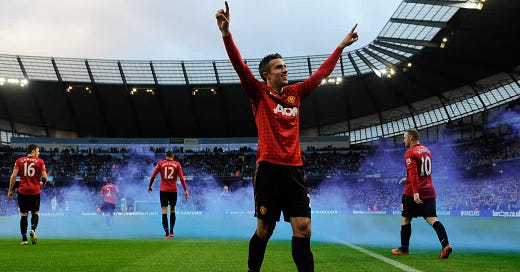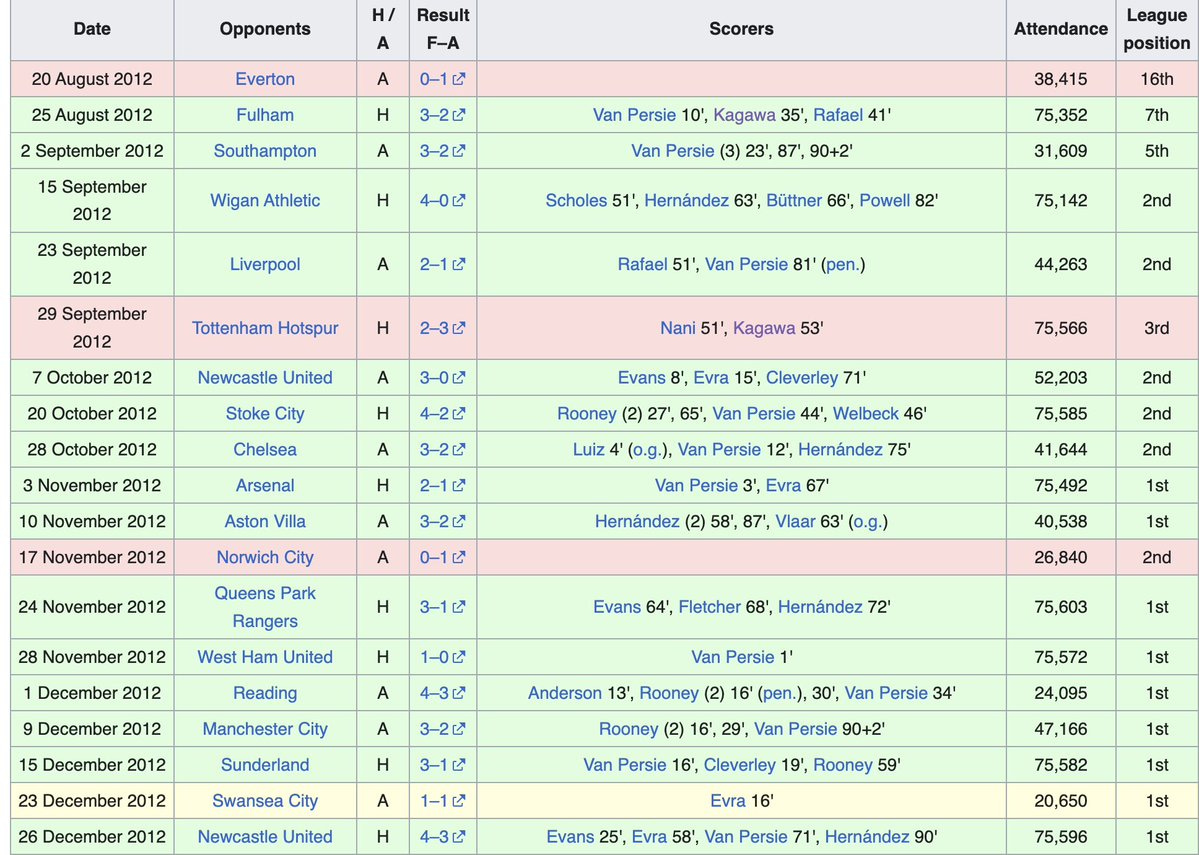Robin van Persie and the importance of making an instant impact
Sometimes you've got to bet it all on winning here and now.
Manchester United’s striker problems are well documented and so is their desire to bring in a new forward during the summer window.
Cristiano Ronaldo departed before the World Cup but he only scored three goals in 16 appearances (scoring at a rate of a goal every 350 minutes), Anthony Martial has been constantly sidelined through injury and though Wout Weghorst tries hard and offers a lot to the team, his goal return (2 in 18) leaves a lot to be desired.
So who do United pick?
Well, a lot of that depends on whether they believe they are in Erik ten Hag’s project. Do they think they are a season or two off a title challenge yet, or do they think with a few pieces and some squad depth that they could make a challenge next year?
If it’s the latter, this may explain the club’s pursuit of Harry Kane. The veteran England striker will only have a year left on his contract next summer and this means he may be available for a cut-price fee (it’s Spurs so Daniel Levy’s version of ‘cut-price’ is usually pricier than other owner’s).
But if United were to sign Harry Kane, this would start a countdown clock on this squad’s lifespan (even more than the one that already exists due to the presence of Casemiro, Raphael Varane and Christian Eriksen), so it will be important that the attacker makes an instant impact.
And in terms of what that looks like, fans may want to look back to Robin van Persie’s stellar debut campaign for United back in 2012/13.
Do I think that even with a few marquee signings this United side can win the Premier League? No, not even close.
This was also the case back in 2012/13 (I was 14 years old so this wasn’t a conscious thought back then, but retrospectively I can say that’s what 25-year-old me would have said back then).
It was for completely different reasons, however. United’s 2012/13 squad was on its last legs.
Rio Ferdinand, Nemanja Vidic and Patrice Evra were ageing out (the first two were also struggling with injury) and their deputies were inexperienced.
United’s midfield was anchored by a stellar Michael Carrick, but then a 38-year-old Paul Scholes who had come out of retirement, Anderson and Tom Cleverley were his choices of partners.
Antonio Valencia had been handed the number seven shirt for this campaign and suffered its curse, Shinji Kagawa failed to make the cut after moving to Old Trafford from Germany (due to injuries he was forced out to the left-hand side where he struggled) and Nani only managed 11 league games due to injury.
The team was held together by string, the sheer will of Sir Alex Ferguson and an incredible attack.
Wayne Rooney and Javier ‘Chicharito’ Hernandez were both excellent and crucial to United’s run, but the credit for the final Premier League win of the Ferguson era should fall solely on the shoulders of Van Persie.
Of course, a lot of comparisons can be made between Van Persie and Kane.
They are/were both veteran strikers scoring shedloads of goals for North London sides that couldn’t make the most of them due to the poor squads surrounding them.
They also both would be moving in the final year of their contract for less than their worth. Throw in that they have both suffered recurring injuries throughout their careers (which throws up some red flags) and you can see why the parallels have been drawn.
I think the main consideration for both transfers is whether they can punch through the ceiling of expectations for the whole squad and drag them to a title.
And to put that into perspective, I think we need to look at just how influential Van Persie was during the 2012/13 Premier League campaign.
Van Persie was signed from Arsenal for a fee of £24m in 2012. I remember exactly where I was when it happened, I was on a cruise ship with my family and I remember running back and forth to the cabin that had Sky Sports News on the TV to see if the deal had gone through.
Back then £24m was a lot for a player regardless (United’s record fee at the time was £30.5m for Dimitar Berbatov in 2008), but given he only had a year left on his contract some eyebrows were raised.1
By the end of the season, with a Premier League winners' medal and a haul of 26 goals and 15 assists to his name, these doubts had obviously dissipated.2
In the final 19 games, United were imperious. They kept 10 clean-sheets and displayed the classic Ferguson mantra of ‘attack wins you games, defence wins you titles.’
If these were the only games we were taking into account, then Van Persie’s contribution to the title win would be a lot less significant.
However, when you look at the first 19 games, you start to understand why many United fans attribute the title win mainly to him (with a few flowers given to the likes of Rooney, Hernandez and Carrick).
I am now going to present you with an image of the single most chaotic set of fixtures I have ever laid eyes upon (and no we are not talking about Boxing Day in 1963):
Not only would United lose their first game of the season (they are still the only club to lose their opener and win the title), but they would concede 2+ goals on 9 occasions, while also only keeping three clean sheets.
Despite all this United, only lost 3 games. If the last 19 games were the embodiment of Ferguson’s adage then this would be an exceptional counterargument.
Bar the loss to Tottenham and the 3-2 win against Aston Villa (though he would get an assist in both), Van Persie scored in every single one of these games.3
And if you’re picky about strikers ‘stat-padding goals’ when the game is already won, if you look at the timestamps for every one of the Dutchman’s goals you can see they were scored at crucial points in the game.
Marcus Rashford is providing a similar service for United currently though in a much less chaotic environment (let’s touch wood that it stays that way given how fatigue is starting to creep in).
Yes, the final 19 game contains the iconic Van Persie game that many refer to when thinking about the 2012/13 season - his hattrick against Aston Villa which not only secured the title but also included his famous volley which won Goal of the Season, but it’s the first 19 that show what he brought to the side.
Ferguson was obviously delighted from Day One; he knew what Van Persie would bring to the side. He would say after he signed the Dutchman:
"We need a finished player. You have to remember that Scholes and Giggs are coming to the end and we need mature, top players to replace that. In our team talks Robin was always a problem for us. He is capable of popping up in positions, so I've taken that problem away from myself and I'm quite happy about that. We never thought we could get Van Persie.”
Ferguson also said how the team would benefit from his maturity for the next four years, which is ironic given the legendary Scotsman retired at the end of the season much to Van Persie’s surprise and the striker himself would leave within three years.
Before we conclude, we do need to consider one more thing. The footballing landscape in 2012, is that it was very different back then to how it is now.
United were still at the top of the pyramid and Manchester City were only just starting to make waves securing their first title in the 2011/12 season. Chelsea, Liverpool and Arsenal were in the mix but it was the consensus that the title would be heading back to Manchester at the end of the 2012/13 season.
United had only lost the title to Roberto Mancini’s side on goal difference in 2011/12, and the Manchester clubs were 19 points ahead of Arsenal in third.
Therefore despite the team being on its last legs, Ferguson knew he only had to beat one club to win the Premier League in 2012/13.
In 2023/24, United will have to contend with City and Arsenal who are already ahead of them, while Chelsea and Liverpool are expected to make some sort of a resurgence.4
It isn’t as simple as just getting an edge on your closest rival by signing the best striker available (unfortunately City already have that). United will be put in a mixer where many other variables are in play.
So what can we take from Van Persie’s story and apply it to the modern day?
Well for one, the fact that the right ‘win now’ signing can exponentially increase your chances of winning the Premier League, especially if they add goals to your attack (as a striker).5
United under Ten Hag are also in a much better place than in 2012/13 so while it is still a decent jump given how much the quality of the league has increased, it won’t be all on someone like Kane’s shoulders to make the difference; Rashford, Bruno Fernandes and several others will also contribute.
But there are also some risks to consider.
United got very lucky with Van Persie’s injury record in the 2012/13 season. He wouldn’t miss a single game through injury during that campaign, but in the following season, he would miss 22.
United managed his minutes well, but given how frequently he was injured before the move there was some good fortune there. Kane hasn’t suffered a recurrence of his ankle injury since April 2021, but there is always the danger of it flaring up again, and that’s a big risk when Spurs are asking for £100m upfront.
And there is also the issue of even if Kane’s goals allow United to take a massive leap forward, will it guarantee a title at the end of it. Ferguson thought this was the case with Van Persie but at that point, he was in an arms race with City (who also wanted RvP) and they hadn’t already stocked piled an armoury full of weapons.
At 30, Kane’s peak years are limited, and I think with the number of young strikers on the market there is no need to self-impose a time limit on your chances to win a trophy.
Victor Osimhen may cost more than Kane but at 23 he is an incredible goalscorer who has over a decade's worth of football ahead of him. Evan Ferguson is a much more raw prospect but he is only 18.
These signings give you more shots at the prize.
Personally, I think Kane is an incredible goalscorer like Van Persie, but the circumstances are different, and that’s why I think United shouldn’t sign him in the summer.
United’s share price actually fell (as per the Financial Times) because some analysts believed they had overpaid for the Dutchman and it was just a move by the Glazers to earn some goodwill.
His form in the following seasons would obviously bring them back to the fore, but other factors such as the departure of Sir Alex Ferguson also had to be considered.
He would also score three goals in the CL group stages during this time, which I felt was important enough for a footnote but not for the article
The league is also just better in general
This is an important distinction, Ronaldo scored a lot for United but his presence negated others’ ability to score therefore he didn’t add goals to the attack but rather replaced them with his own.






